
Thomas Daniel "Tim" Conway was an American actor, comedian, writer, and director. Conway is perhaps best known as a regular cast member (1975–1978) on the TV comedy The Carol Burnett Show where he portrayed his recurrent iconic characters Mister Tudball and the Oldest Man. Over his career he received numerous accolades including five Primetime Emmy Awards and a Golden Globe Award. He received the Hollywood Walk of Fame in 1999 and was inducted into the Television Hall of Fame in 2002.
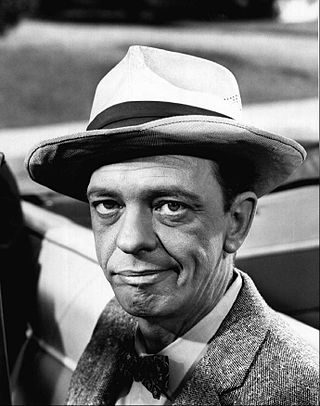
Jesse Donald Knotts was an American actor and comedian. He is widely known for his role as Deputy Sheriff Barney Fife on the 1960s sitcom The Andy Griffith Show, for which he earned five Emmy Awards. He also played Ralph Furley on the highly rated sitcom Three's Company from 1979 to 1984. He starred in multiple comedic films, including leading roles in The Incredible Mr. Limpet (1964) and The Ghost and Mr. Chicken (1966). In 2004, TV Guide ranked him number 27 on its 50 Greatest TV Stars of All Time list.
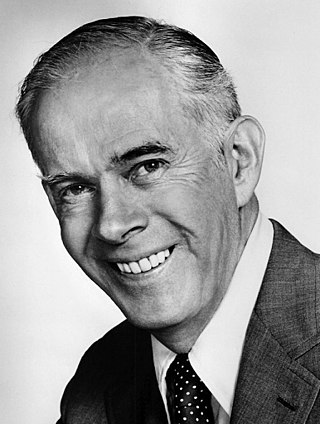
Harry Morgan was an American actor whose television and film career spanned six decades. Morgan's major roles included Pete Porter in both December Bride (1954–1959) and Pete and Gladys (1960–1962); Officer Bill Gannon on Dragnet (1967–1970); Amos Coogan on Hec Ramsey (1972–1974); and his starring role as Colonel Sherman T. Potter in M*A*S*H (1975–1983) and AfterMASH (1983–1985). Morgan also appeared as a supporting player in more than 100 films.

John Robert Anderson was an American character actor who performed in hundreds of stage, film, and television productions during a career that spanned over four decades.

The Apple Dumpling Gang is a 1975 American comedy-Western film directed by Norman Tokar. The plot is about a slick gambler named Russell Donovan who is duped into taking care of a group of orphans who eventually strike gold. The film was produced by Walt Disney Productions.
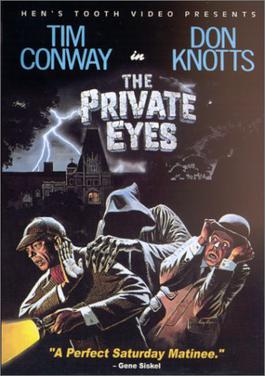
The Private Eyes is a 1980 American comedy mystery film starring Tim Conway and Don Knotts. The pair play bumbling American detectives who work for Scotland Yard. It was filmed at Biltmore Estate in Asheville, North Carolina.

John Irwin McGiver was an American character actor who made more than a hundred appearances in television and motion pictures over a two-decade span from 1955 to 1975.
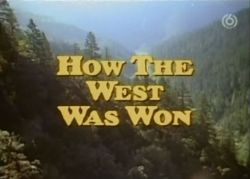
How the West Was Won is an American Western television series that starred James Arness, Eva Marie Saint, Fionnula Flanagan, Bruce Boxleitner, and Richard Kiley. Loosely based on the 1962 Cinerama film of the same name, it began with a two-hour television film, The Macahans, in 1976, followed by a mini-series in 1977, and a regular series in 1978 and 1979.
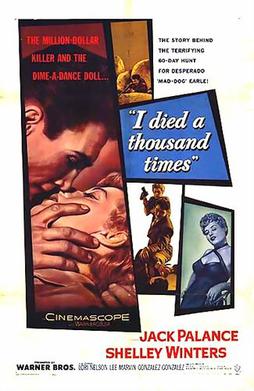
I Died a Thousand Times is a 1955 American CinemaScope Warnercolor film noir directed by Stuart Heisler. The drama features Jack Palance as paroled bank robber Roy Earle, with Shelley Winters, Lee Marvin, Earl Holliman, Perry Lopez, Pedro Gonzalez Gonzalez, and Lon Chaney Jr.

Robert Golden Armstrong Jr. was an American character actor and playwright. A veteran performer who appeared in dozens of Westerns during his 40-year career, he may be best remembered for his work with director Sam Peckinpah.

John Crawford was an American actor. He appeared in a 1961 episode of The Twilight Zone, called "A Hundred Yards Over the Rim", and in several Gunsmoke episodes. He had a key role in the 1975 film Night Moves, a crime thriller starring Gene Hackman, played the mayor of San Francisco in 1976's The Enforcer and the third Dirty Harry film featuring Clint Eastwood, as well as the Chief Engineer in Irwin Allen's classic 1972 box-office smash and disaster-film epic The Poseidon Adventure.
The Reno Gang, also known as the Reno Brothers Gang and The Jackson Thieves, were a group of criminals that operated in the Midwestern United States during and just after the American Civil War. Though short-lived, the gang carried out the first three peacetime train robberies in U.S. history. Most of the stolen money was never recovered.

Sierra No. 3, often called the "Movie Star locomotive", is a 19th-century steam locomotive owned by the State of California and preserved at Railtown 1897 State Historic Park in Jamestown, California.

Badman's Territory is a 1946 American Western film starring Randolph Scott. It was followed by the loose sequels Return of the Bad Men (1948) and Best of the Badmen (1951).
The Prize Fighter is an American comedy film starring Tim Conway and Don Knotts. Directed by Michael Preece, it was written by Tim Conway and John Myhers, based on a story by Conway. It was released by New World Pictures in November 1979.
Gun Shy is an American sitcom that was shown on CBS from March 15 to April 19, 1983. The series, produced by Walt Disney Productions, was based on its popular comedy Western films The Apple Dumpling Gang (1975) and The Apple Dumpling Gang Rides Again (1979).

Ralph Manza was an American character actor who made over 160 appearances in American film and television shows.

Claire Carleton was an American actress whose career spanned four decades from the 1930s through the 1960s. She appeared in over 100 films, the majority of them features, and on numerous television shows, including several recurring roles. In addition to her screen acting, she had a successful stage career.
The 1979 Stinkers Bad Movie Awards were released by the Hastings Bad Cinema Society in 1980 to honour the worst films the film industry had to offer in 1979. The ballot was later revisited and the expanded version was released in late 2004. Listed as follows are the original ballot's picks for Worst Picture and its dishonourable mentions, which are films that were considered for Worst Picture but ultimately failed to make the final ballot, and all nominees included in the expanded ballot. All winners are highlighted.















